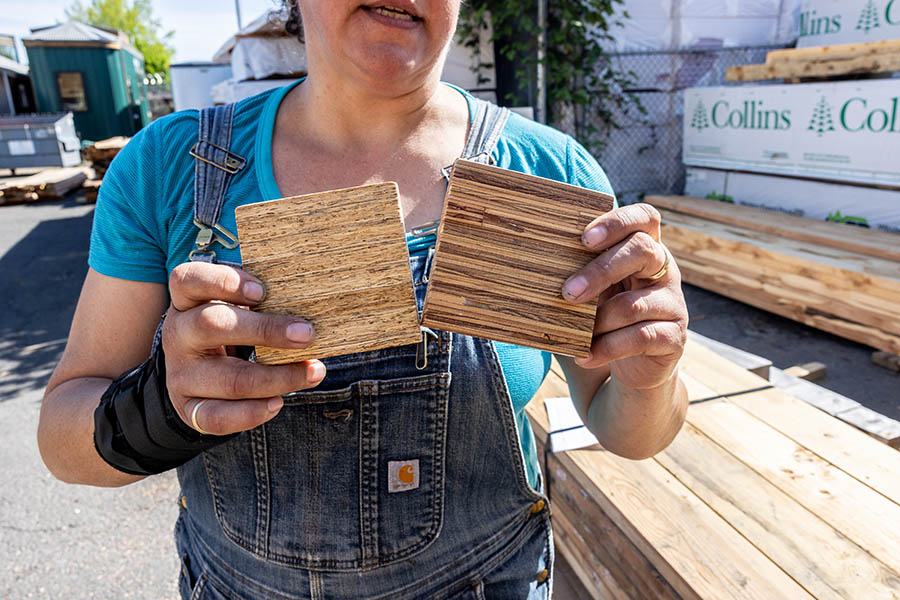A coalition of women-owned businesses is reclaiming the stumps of Stumptown in dozens of ways.
The lumber industry has historically been dominated by men because of the strength needed to cut down, haul and move the products from one place to another. But a state that once built its economy on trees is now a leading voice in how to promote conservation regarding how lumber is grown, sustainability in how it is used and reused, and equity around supporting businesses that challenge gender and racial power imbalances in the wood-related industry.
Oregon Business talked to three women who are staking claim in this sustainable-development industry to help bring “yes and” creative thinking to the question of how to make money off lumber — but also to widen the benefit to community, while acknowledging a commitment to the quality of life for future generations.
Each of the women are members of a relatively new group called Women in Sustainable Endeavors (W.I.S.E.), which meets quarterly to connect, share ideas, develop collaborations and provide emotional support.
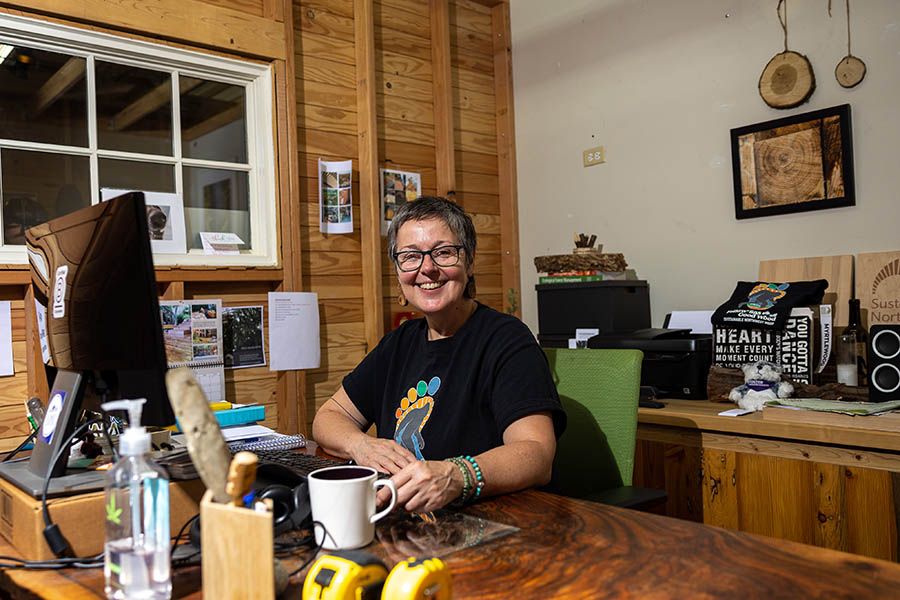
The group was founded by Lynn Morgan, who started working at Sustainable Northwest Wood five years ago, a Southeast Portland-based lumber yard that was the first in Oregon to exclusively offer for sale sustainably harvested and reclaimed wood from local mills to construction firms and to members of the public. The business, founded in 2008 by Ryan Temple, also is committed to widening the economic, community and environmental contributions of farms, ranches and forests to clean energy, clean water and green markets in the greater Northwest. Because of Morgan’s efforts, Sustainable Northwest Wood has become a hub of emotional and collaborative support for women-owned businesses that are navigating pathways that have historically had so few women in decision-making roles. WISE started with 10 women but has grown to 35 members within the last year.
“There’s a need and a hunger for women to gather together because it is such a male-dominated society,” Morgan tells OB. “There’s something really special about the collaboration and the connection and the support that you can get women-to-women that we have found within the group.”
Morgan also supports the annual Sustainable Building Week conference, held during the second Monday of every October to cross-pollinate practices between engineers, architects, builders, design professionals and others who work in the realm of sustainability. The next monthly, in-person Sustainable Building networking event is June 13, 5 p.m., at the five-story PAE Living Building.
Lynn Morgan
Sustainable Northwest Wood
Growing up in a wooded area in Eastern Kentucky, Lynn Morgan was taught to embrace sustainability as a way to avoid compromising the livelihoods of future generations. Her father was a carpenter; her schools pushed agriculture education.
“We were raised to not waste anything, to reuse things,” Morgan says. “Even back in the ’90s, I was an avid recycler, much to my mother’s dismay seeing a big pile of recycling in the kitchen corner.”
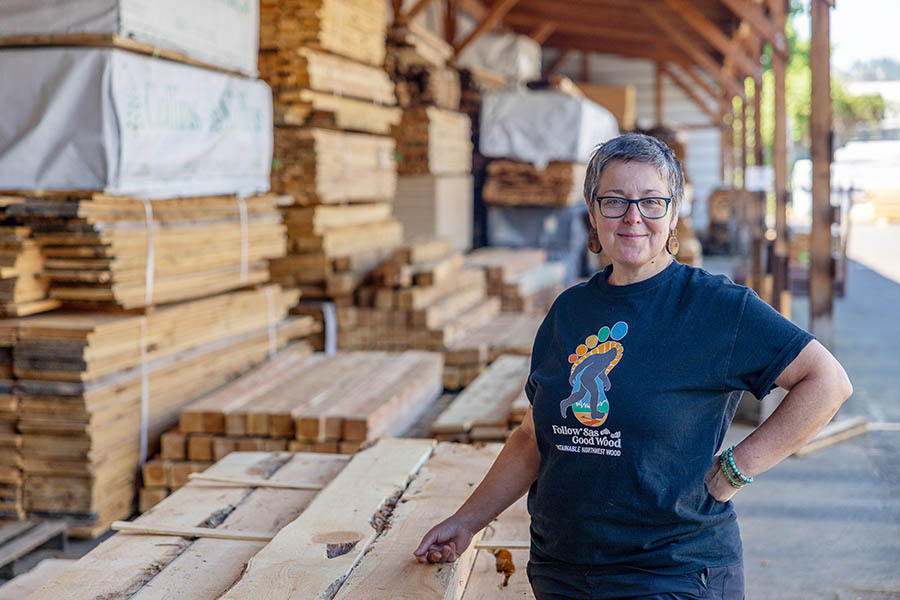
But Morgan says she really embraced sustainability as an ethos when she attended her first Earth Day event in college. “That inspired me in my whole career path, really, just to think about doing things in a different way,” she says.
Now, in her job as marketing manager for Sustainable Northwest Wood, she uses storytelling to educate individuals and builders about different species of Oregon-based wood that are used for products from flooring to conference-room tables. Whether it’s an oak tree that came down in an ice storm, the blue-tinted slabs from pine trees that were killed by beetles or a sweet-smelling but invasive juniper tree — these trees can now be celebrated and remade as flooring, siding, doors and butcher blocks.
“It’s really satisfying, the storytelling piece of it,” Morgan says. “It makes for a more meaningful piece of furniture….I don’t know of any other company that is solely dedicated to local and sustainable wood products.”
Sustainable Northwest Wood is also connected to the renovations happening at the main terminal in the Portland International Airport, which sustainably sourced at least 98% of its wood from well-managed forests in Oregon and Washington. Staff at Sustainable Northwest Wood helped connect The Port of Portland to landowners, including Indigenous tribes and small family-owned forests who had access to responsibly sourced Douglas fir lumber. The collaboration merited the Port, Sustainable Northwest Wood and Portland-based Timberlab a 2022 Leadership Award from the Forest Stewardship Council, a nonprofit that operates in 80 countries and has certified more than 4,000 companies and 160 million acres of forestland in the United States and Canada.
Christy Covington
Tree to Table PDX
Christy Covington, a Portland native who had a 41-year career in the U.S. Forest Service, started getting interested in sustainable wood products as a passion project. Her first job at age 15 was to use axes to chop down juniper trees in Central Oregon.
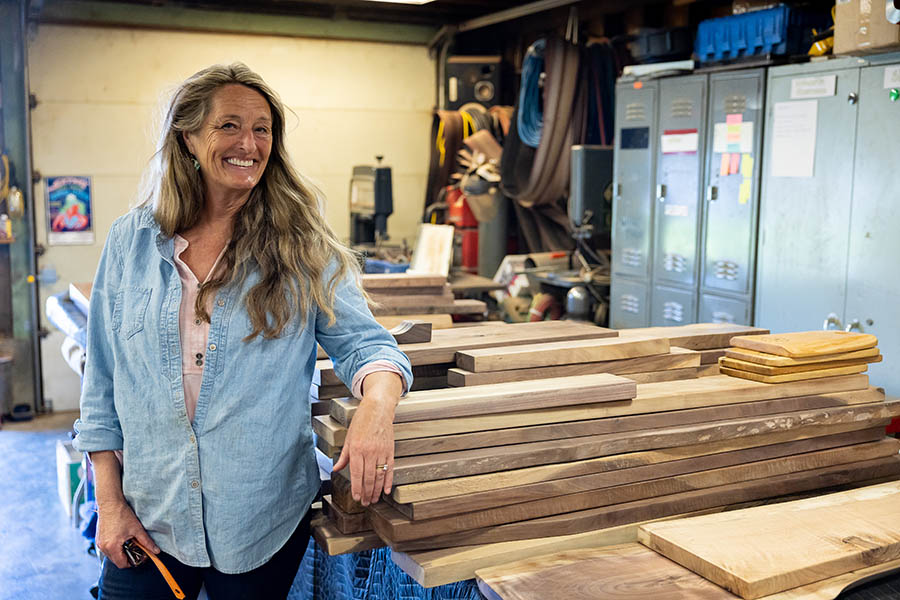
“I’m truly such a tree lover that I remember thinking ‘Why do we have to cut these down?’ ” Covington says. “That’s when I first started learning about ecosystems, about the land. I was a city girl, so at a very young age, I got to be hands-on working in that field. And it changed my life. That’s when I fell in love with the outdoors, with the trees.”
Meanwhile, her husband, Curtis Falbo, was building his arborist company, Wind Thin Tree Service, over 23 years. He eventually started salvaging the wood of the maples, black walnut, red oak, dogwood and cherry trees he was hired to cut down so that they wouldn’t be slashed into wood chips. But he didn’t have a plan for what he would do with the stockpile of wood in his Northeast Portland backyard. According to Covington, it takes each log two to three years to dry enough to be ready for sanding, shaping and texturing the slabs.
“He was hoarding logs in our backyard,” Covington says, laughing. “I started seeing more and more of the waste that goes on with tree companies and there was no real avenue to collect, save, store, do things.”
So she started learning more about the different species of hardwood trees, and practiced sanding and using finishing techniques on scrap wood in a corner of her husband’s backyard garage, built from wood from a church he had salvaged.
“He had a lot of tools and things, so I just started learning on my own,” she said. “I would go to my husband when I would get stuck, and he was just this great resource.”
Eventually, in early 2020, her hobby evolved into a business, Tree to Table, which designs and sells dining room tables, coffee tables, shelving, charcuterie boards and even one-of-a-kind wall art at three different consignment shops — two in Southeast Portland and one in Bend, where she first fell in love with trees as a teenager. Covington also creates and packages an organic beeswax wood conditioner from her backyard bees. And she has now hired several young people to work for her. She has a passion for encouraging people to have more wood inside their homes is to keep them connected, in some way, to the outdoors.
“Lynn [Morgan] has truly been an inspiration for me because I got myself into something very male-dominated, and it’s really great to connect with other women and that synergy and that support,” says Covington, one of the first members of WISE. “We’re pretty small-scale, but we’re learning what people love. It’s a labor of love.”
Valerie Carey
Sankofa Lumber
Valerie Carey’s parents both ran their own businesses, and she too sought ways to create her own lane. After she obtained her master’s degree in international management, she worked for a series of nonprofits and eventually landed, in 2014, at the ReBuilding Center in Northeast Portland, which repurposes building materials from deconstructed houses.
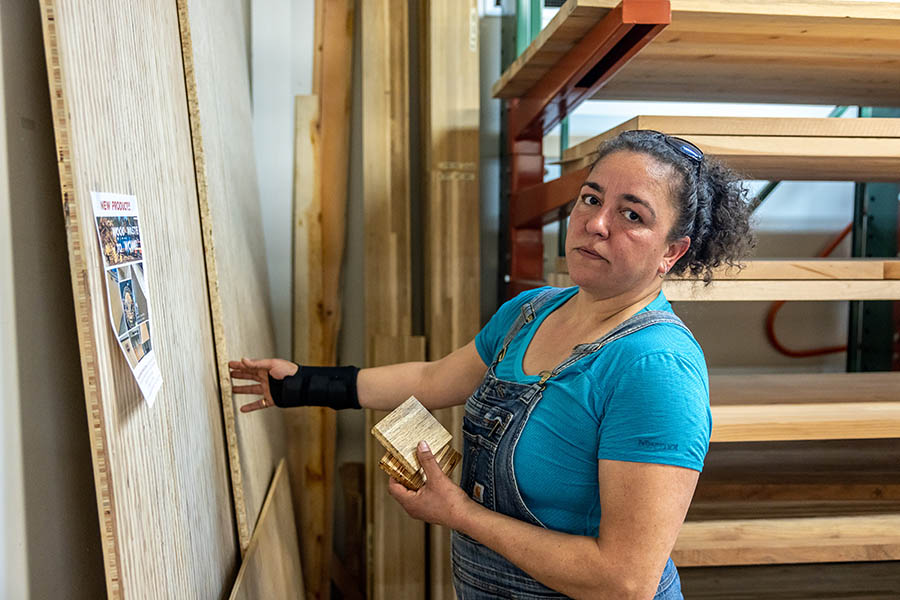
After seven months, Carey became a manager for City of Roses Disposal & Recycling, where she did market research and cost analysis of its recycled-waste streams, such as lumber, cardboard, metals and concrete from construction sites.
“When I saw the amount of viable, usable lumber that was just being ground up and sold way up north as boiler fuel for paper mills, I lost it,” says Carey, a former construction worker and carpenter. “Very few jobs are created from that, and very little economic value captured, let alone the environment value that should have been captured.”
So she did the market studies and launched into a few years of business planning and research. She said she was shocked to discover an untapped market that could eventually lessen the need to clearcut forests in order to harvest wood that would eventually be wasted.
“In Oregon we’re generating about a half-million ton’s worth of wood waste, primarily from construction,” Carey says. “That pencils out to — depending on the year — about 20% of what Oregon actually produces as a timber state. So when people talk about closing the loop and circular economy, we are essentially throwing away the equivalent of 15% to 20%of what we actually harvest from our forest to bring to market.”
So in 2017, Carey started her own company, Sankofa Lumber, to start to reclaim some of the 35 million tons of wood waste generated around the country by the construction industry. The Ghanaian word “sankofa” means “it is not taboo to retrieve what has been forgotten.”
Carey’s business model seemed so common sense to her that she was surprised that she couldn’t find anyone else in Oregon who thought of it first. It took her expertise and analysis of business practices to see this opportunity staring her in the face.
“It’s such a system-level intervention point, in my mind,” Carey says. “To both deal with waste as well as keep things as local as possible, create those social benefits, create those environmental benefits, create those local economic benefits — and keep all that within our region as much as possible.”
In order to consistently produce the amount of lumber that builders need, Sustainable Northwest Wood agreed to invite Carey into its already established ecosystem by providing any amount or type of new wood that is not in Carey’s inventory of salvaged wood.
“This is a game-changing thing that she is trying to do,” Morgan says. “So we are distributing her products and working really closely with her to introduce her products to the design community and builders, and really helping to create a circular economy by bringing that wood waste back into the built environment.”
“That’s one of the edges that we as women have, broadly speaking,” Carey says. “We tend to be more collaborative and we tend to be big picture and find the ways that people can lean into their strengths, and still have healthy partnerships that get everyone to where they want to go.”
Editor’s Note: This story has been corrected from an earlier draft to accurately describe Valerie Carey’s degree. The translation of the word “sankofa” has also been updated to a more detailed definition.
Click here to subscribe to Oregon Business.


